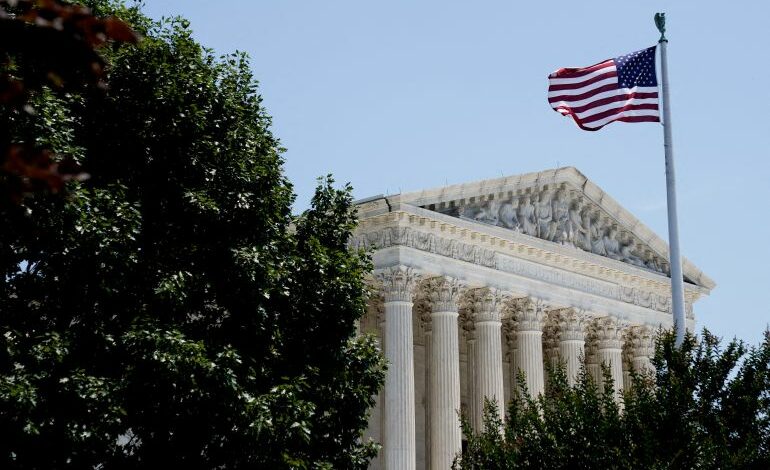US top court bans colleges from considering race in admissions

The United States Supreme Court has ruled that colleges must stop considering race as a factor in their admission policies, dealing a setback to so-called “affirmative action” efforts aimed at boosting the enrolment of Black and Latino students at top universities.
The top court’s decision on Thursday came in response to lawsuits that challenged the policies of Harvard University and the University of North Carolina (UNC) by claiming race-conscious student admissions programmes discriminate against white and Asian-American applicants.The United States Supreme Court has ruled that colleges must stop considering race as a factor in their admission policies, dealing a setback to so-called “affirmative action” efforts aimed at boosting the enrolment of Black and Latino students at top universities.
The top court’s decision on Thursday came in response to lawsuits that challenged the policies of Harvard University and the University of North Carolina (UNC) by claiming race-conscious student admissions programmes discriminate against white and Asian-American applicants.Asked whether the Supreme Court is “rogue”, Biden said it is not a “normal” court.
The top court ultimately found affirmative action to be in violation of US Constitution provisions that establish equal protection under the law.
“College admissions are zero-sum. A benefit provided to some applicants but not to others necessarily advantages the former group at the expense of the latter,” the Supreme Court said in its decision, embracing the argument that affirmative action benefitting some minority students disadvantages others.
Decision and dissent
The vote was six-to-three in the UNC case and six-to-two in the Harvard case, with Justice Ketanji Brown Jackson recusing herself from the latter because she had been a member of an advisory governing board at the university.In a dissenting opinion, liberal Justice Sonia Sotomayor wrote that “indifference to race” does not advance equality, stressing that racial inequality continues to prevail in the US, including at UNC and Harvard.
“Ignoring race will not equalize a society that is racially unequal. What was true in the 1860s, and again in 1954, is true today: Equality requires acknowledgment of inequality,” she said, referring to the US Civil War that ended slavery and the Civil Rights movement, respectively.
The NAACP civil rights advocacy group was quick to denounce the top court’s ruling on Thursday.
“This is a dark day in America,” Wisdom Cole, national director of the group’s youth and college division, said in a statement.
“Affirmative action has been a beacon of hope for generations of Black students. It stood as a powerful force against the insidious poison of racism and sexism, aiming to level the playing field and provide a fair shot at a high-quality education for all.”
Democratic Senate Majority Leader Chuck Schumer also decried the decision, calling it a “giant roadblock” in the country’s march towards racial justice.
“Ignoring race will not equalize a society that is racially unequal. What was true in the 1860s, and again in 1954, is true today: Equality requires acknowledgment of inequality,” she said, referring to the US Civil War that ended slavery and the Civil Rights movement, respectively.
The NAACP civil rights advocacy group was quick to denounce the top court’s ruling on Thursday.
“This is a dark day in America,” Wisdom Cole, national director of the group’s youth and college division, said in a statement.
“Affirmative action has been a beacon of hope for generations of Black students. It stood as a powerful force against the insidious poison of racism and sexism, aiming to level the playing field and provide a fair shot at a high-quality education for all.”
Democratic Senate Majority Leader Chuck Schumer also decried the decision, calling it a “giant roadblock” in the country’s march towards racial justice.
Affirmative action, Jordan explained, was about “not just trying to redress past discrimination, but it also [helped] the schools achieve what they believe is a laudable goal, which is to expose young people who are just starting out in life to other people of different backgrounds”.
Nine US states have already banned colleges from considering race in applications, and several of them saw a drop in minority student enrolment after the restriction.
For example, at the University of Michigan, Black student enrolment dropped to 4 percent in 2022 from 7 percent when the state ended affirmative action in 2006.
Harvard said on Thursday that it will push to preserve its “essential values” while complying with the Supreme Court’s decision.
“We write today to reaffirm the fundamental principle that deep and transformative teaching, learning, and research depend upon a community comprising people of many backgrounds, perspectives, and lived experiences. That principle is as true and important today as it was yesterday,” the university’s leaders said in a statement.











